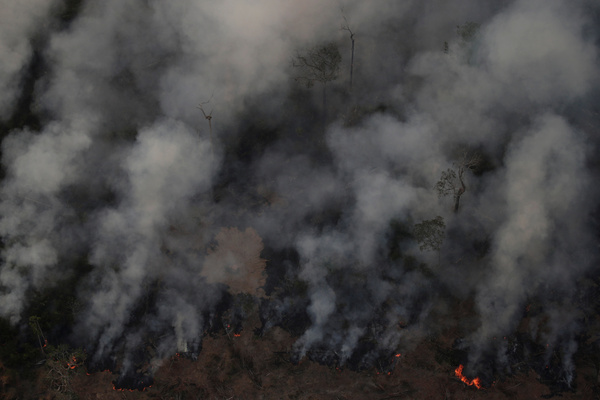The Amazon rainforest, ablaze in Brazil
Go Deeper.
Create an account or log in to save stories.
Like this?
Thanks for liking this story! We have added it to a list of your favorite stories.

International concern is growing over the rapidly spreading fires that are destroying large swaths of the Amazon rainforest.
The fires were most likely started by farmers clearing land, but have spiraled out of control. In just the past month, about 36,000 fires have ignited — nearly as many as in all of 2018, according to Brazil's National Institute for Space Research. Overall, there have been 74,155 fires so far this year — mostly in the Amazon — an increase of about 80 percent compared to last year.
World leaders are starting to sound the alarm.
"Our house is burning. Literally. The Amazon rain forest – the lungs which produces 20 percent of our planet's oxygen – is on fire," French President Emmanuel Macron wrote in a tweet Thursday.
Turn Up Your Support
MPR News helps you turn down the noise and build shared understanding. Turn up your support for this public resource and keep trusted journalism accessible to all.
Calling it an international crisis, he urged asked those attending the G-7 Summit this weekend — hosted by France — to put the fires at the top of the agenda.




NPR's Philip Reeves says a reporting trip to the state of Acre in western Brazil gave him a sense of the scale of destruction.
"This area of land here — well inside the Amazon rainforest — is burning. I can see charred tree stumps all around me, smoke rising not just above this particular part of the fire but over in the distance," he says. "All around, I can see the forest. But I can also see a large area — maybe 10, 12 football fields — that has been burned."
Brazil's president, Jair Bolsonaro, recently announced that he plans to send Brazil's army to handle the fires. But the far-right Brazilian leader has not taken decisive action so far; and many believe his desire to develop the Amazon may have played a role in his lack of a clear response.

Copyright 2019 NPR. To see more, visit https://www.npr.org.




